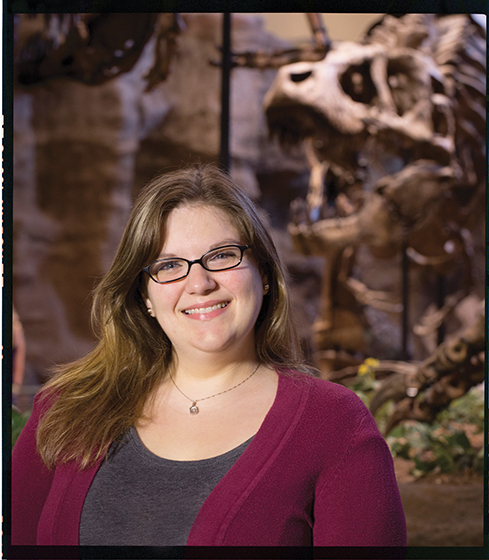 Fall 2013
Fall 2013|
Lauren Talotta
When she first met her husband seven years ago, Lauren Talotta didn’t mince words: “I am a huge dork, an epic nerd. Are you sure you want to go on a date with me?” He said yes, no doubt realizing there was more to her story. Demandingly curious and unapologetically competitive, Talotta is one part Type-A overachiever and another part wide-eyed kid who really doesn’t want to grow up. After seeing the movie Jurassic Park at the ripe old age of 10, she insisted on reading the Michael Crichton novel. “It took me the whole summer; every two seconds I was either asking my parents to pronounce a word for me or finding a dictionary to look something up. It’s still my favorite book,” she says. It even inspired her 8th-grade project at Carnegie Science Center’s annual Pittsburgh Regional Science and Engineering Fair (PRSEF), when she tried to extract DNA from a bison fossil. Today, with a degree in information technology from Penn State and a position as instructional technologist at Pitt’s Institute for Clinical Research Education, where she manages the graduate-level program’s online Blackboard site, Talotta is a great example of where a passion for science can lead you. And she’s still not mincing words: “I feel like science fairs turned me into the person I am today.” That person, now a new mom, continues her PRSEF involvement as a judge and as co-manager of one of its award categories, along with her father. It gives Talotta the opportunity to hang out with fellow nerds of all ages (father included), and help inspire a new batch of scientific dreamers. Were you always into science?I was that 8 year old who turned on the Learning Channel and wanted to watch operations. I’m, like, this is cool, look at that, look at them poke at that person’s liver! And my parents both encouraged me early on. They both worked in medical laboratories. My dad has since migrated into computers, which is how I ended up fishtailing into computers.Did you get that same encouragement in school?I had a middle-school teacher, Marla King, who was very passionate about science and science fairs. But my high school was significantly more concerned about athletics than it was about academics. I had to enroll myself in the Pittsburgh Science Fair in 9th, 11th, and 12th grade, and I had to beg to have teachers accompany me. One year my high school biology teacher wrote in my yearbook, “Thank you for reminding me why science fairs are important.” I hope he still remembers 13 years later.Were you a natural at your first science fair?My first project, in 6th grade, was an epic failure. I learned a lot, but I didn’t win anything. When I came home really devastated that I didn’t win, I went with my parents to the open house that night and we studied every project that won something to try to figure out where I went wrong. I just remember thinking, this really sucks—I’m not having this happen again!So now you’re one of the judges. What’s that like?I love it. I especially love the 6th graders. They are just so enthusiastic. And it only takes 30 seconds of encouragement from a grown-up to set them on the path that I got set on, and encourage them to—even if you don’t win an award—come back and try again. Science fairs taught me so much. They taught me public speaking. They taught me to know when I am a content expert and to be able to explain that content to anybody that approaches me. And I always tell kids that “I don’t know” is a perfectly acceptable answer. Does one student or one moment stand out?It’s walking into the room with the 6th graders each year, and seeing the joy and the utter fright on their faces. And it feels like this epic weight that I am obligated to shoulder to just give them something, and pretend to be the grown-up they think I am! But science fairs really did turn me into the grown-up I am today. And I hope that, 13 years down the road, some kid can say the same thing. And, even if they don’t remember it, somewhere in that history is two minutes spent with me, in front of their backboard, asking them questions and encouraging them. I just want to be in that history somewhere—because somewhere in that room could be the person who cures cancer, or the person who figures out how to make stem cells to cure Parkinson’s. And if I don’t do anything else, I hope that I can encourage some kid to do something really great with their life.
|
2013 Carnegie International · Artist as Activist · History Redux · Artists In Their Own Words · Frozen In Time · The Stand-In · Director's Note · NewsWorthy · Science & Nature: Cultural Craftsman · About Town: Wild by Design · The Big Picture
 |
Copyright © 2017 CARNEGIE Magazine. All rights reserved. |

